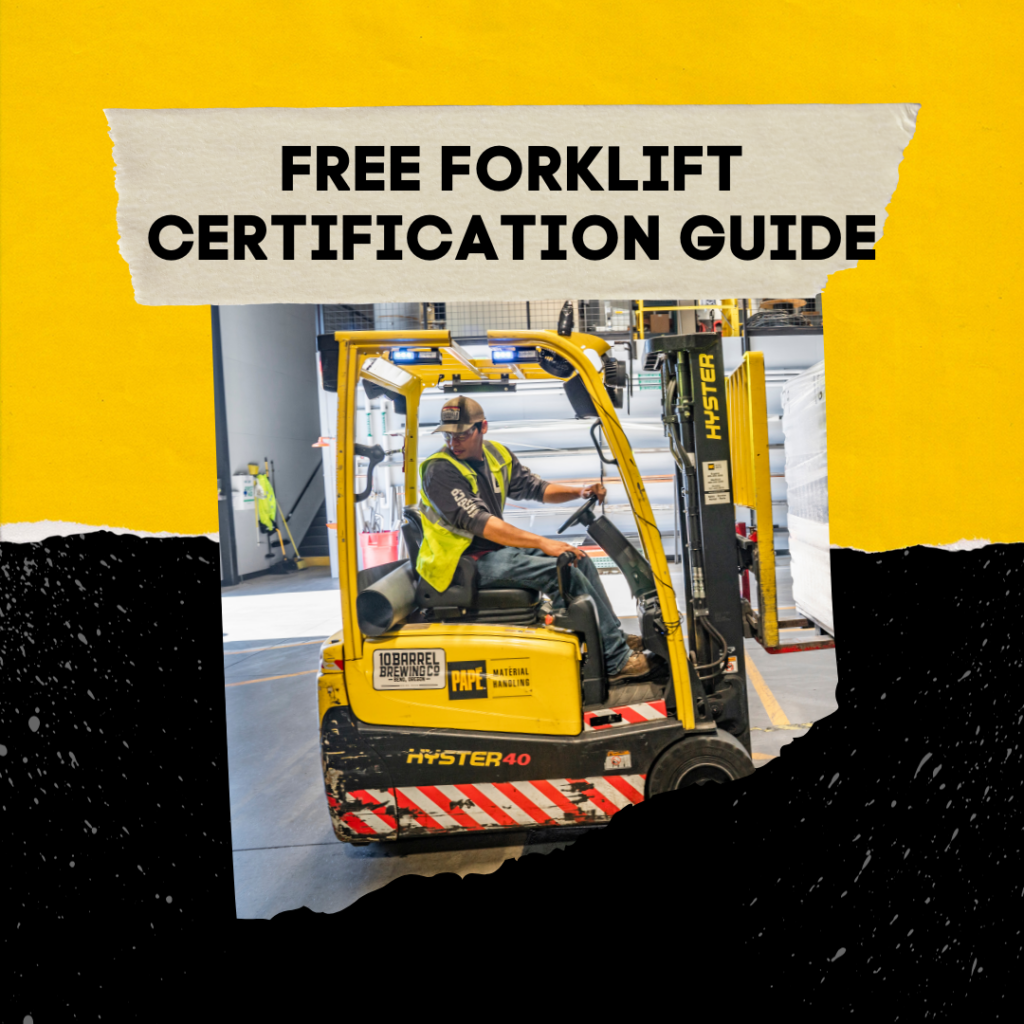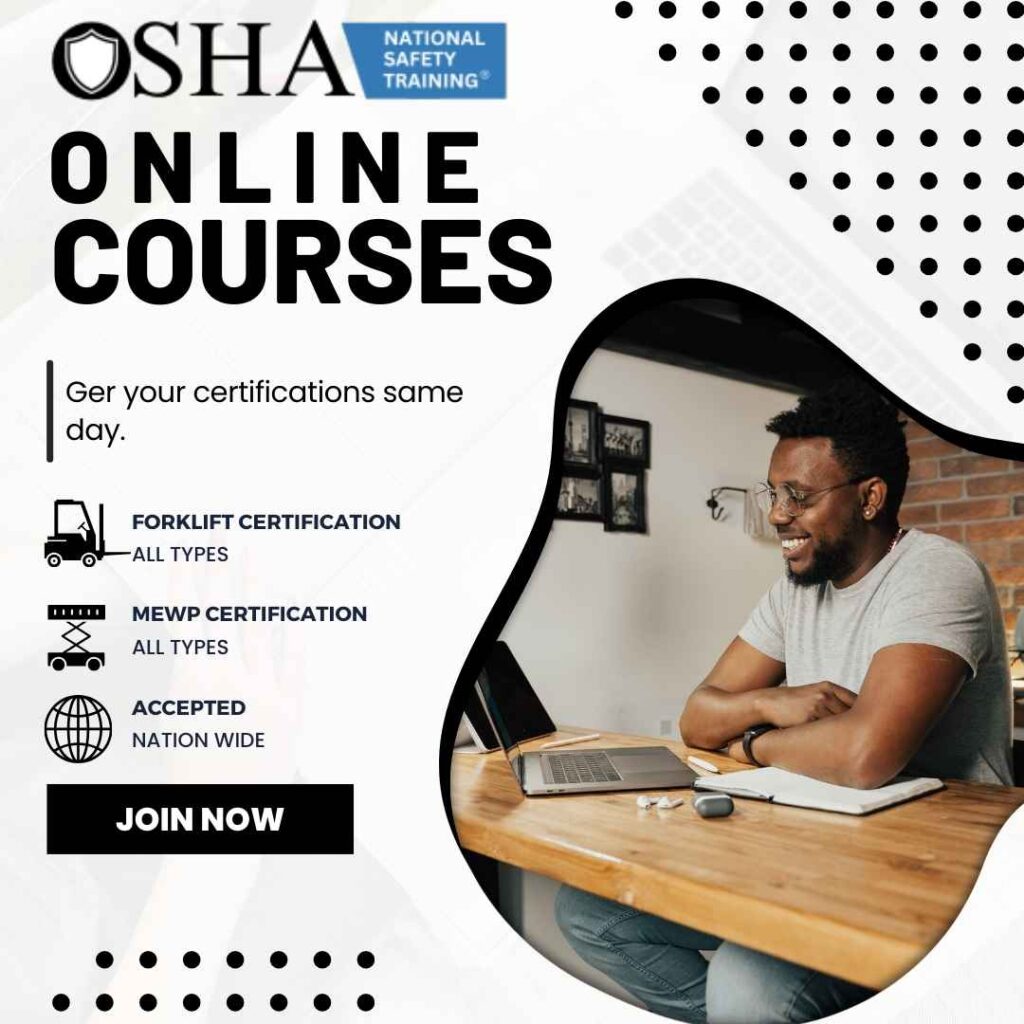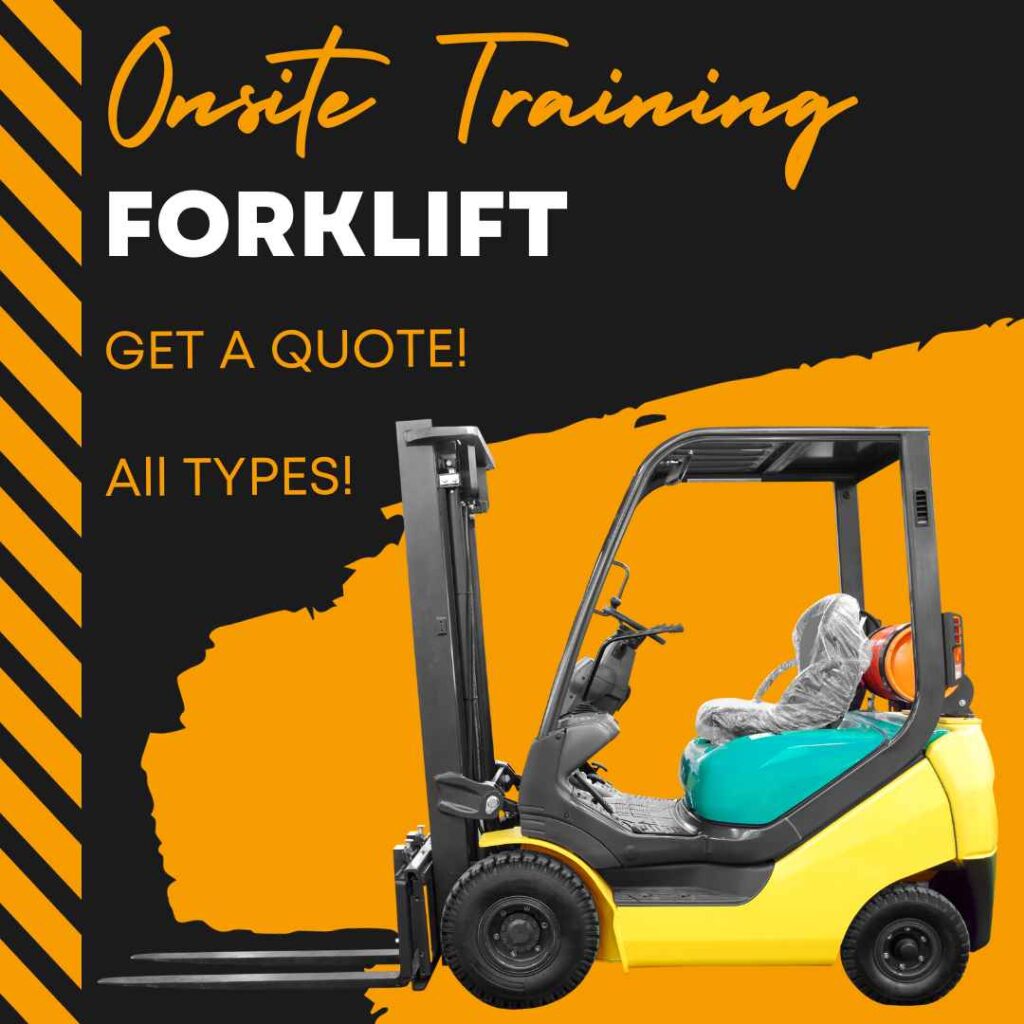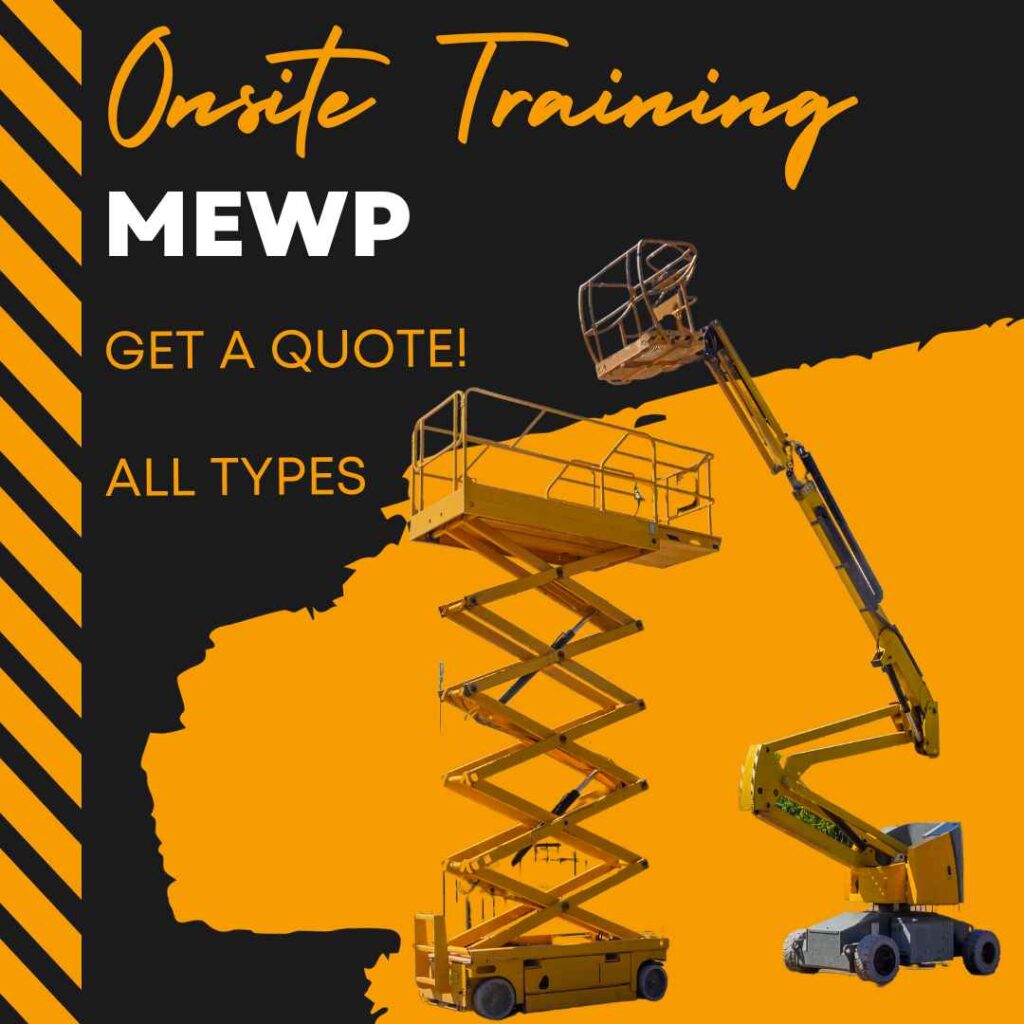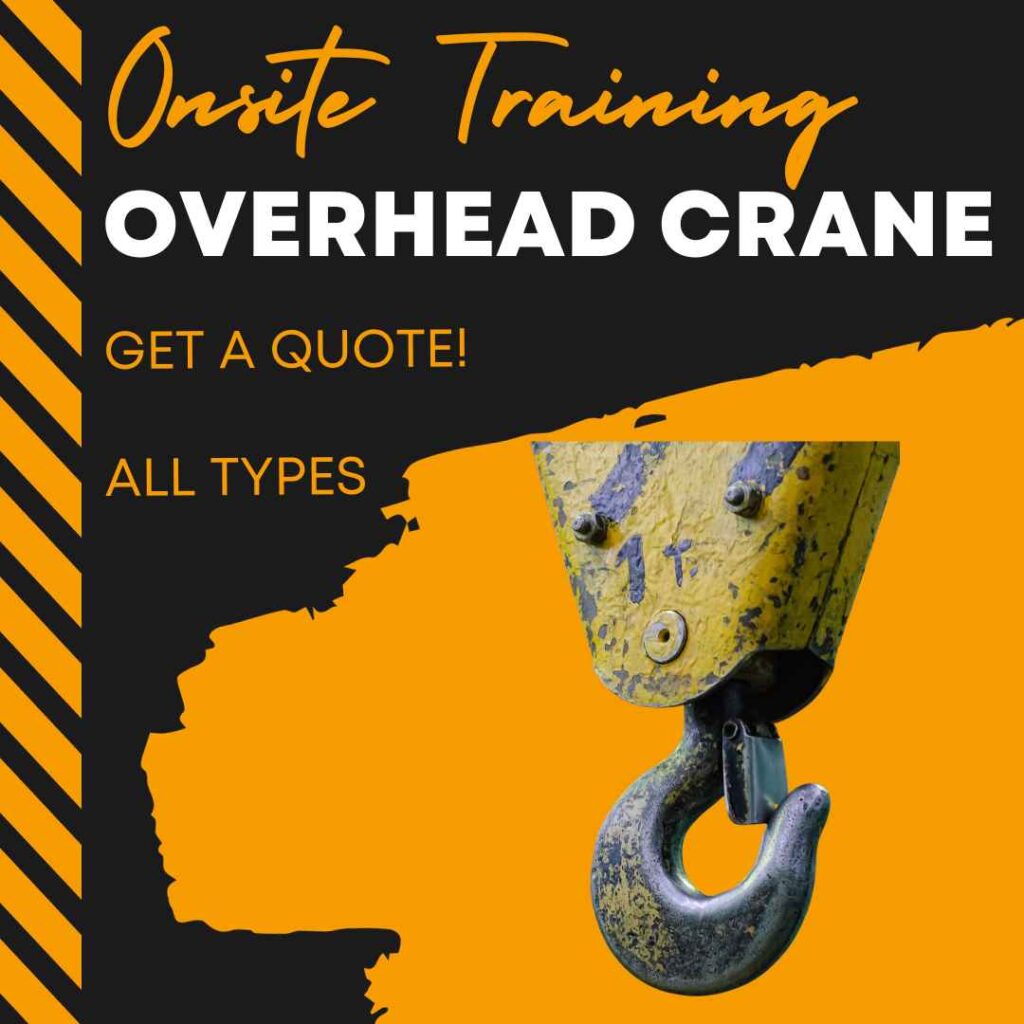Forklift Jobs And Training Requirements

Considering a career that keeps you active and is always in demand? Forklift operators play a crucial role in keeping warehouses and industries running smoothly. This article will be your roadmap, guiding you through the essential training requirements and steps to become a certified forklift operator, ensuring you’re ready for this hands-on job opportunity.
Jumpstart your future today!
What Forklift Operators Do: Roles and Responsibilities

As a forklift operator, your primary responsibilities include navigating warehouse spaces, handling materials, and ensuring safety procedures are followed at all times. Your role is crucial in maintaining the efficient operation of industrial trucks and other material handling equipment.
Warehouse navigation
You need to know your way around the warehouse. This means understanding how to move through tight spaces without hitting anything. You will use paths marked on the floor to drive the forklift safely from one place to another.
Finding items quickly is part of your job too. You will learn where everything is stored. Your goal is to pick up and drop off goods fast, helping everyone get their work done on time.
Material handling
Moving and sorting items are big parts of a forklift operator’s day. You must know how to safely lift, carry, and stack goods using forklifts. It is your job to keep the workplace neat and ordered.
Your skills in material handling also mean you make sure products don’t get damaged. This takes care and attention. A good grip on safety rules helps everyone stay safe while moving things around.
Keeping track of where stuff goes is part of your tasks too. Using knowledge about warehouse layout lets you put things in the right spots quickly. That helps the warehouse run smooth like clockwork.
Safety procedures
Keeping everyone safe is a big part of your job as a forklift operator. You must know how to drive and control the forklift correctly. This means understanding how much weight it can carry and when to move slowly or quickly.
Always look where you’re going, keep an eye out for people around you, and use the right signals to let others know what you are doing.
Wear your seatbelt every time, even if you are just moving a short distance. Make sure all your safety lights and sounds are working before starting up the machine. If something on your forklift seems wrong, stop using it right away and tell someone who can fix it.
Now let’s talk about training and certification that help make these safety habits second nature.
Training and Certification for Forklift Operators

To become a forklift operator, you need to undergo specific training and obtain certification to ensure the safe operation of industrial trucks. This includes fulfilling OSHA requirements, receiving hands-on experience with different types of forklifts, and gaining knowledge in safety procedures.
OSHA requirements
To meet OSHA requirements, forklift operators must complete certification training through an approved program. The training covers essential topics like safe operation, hazard recognition, and understanding workplace regulations.
You’ll also learn about the different types of forklifts and their specific handling procedures. Additionally, OSHA mandates that refresher training should be undertaken every three years or when involved in an accident or near-miss incident.
Fulfilling OSHA requirements ensures that you understand how to operate a forklift safely and follow industry standards. Your certification demonstrates your commitment to workplace safety and helps protect both yourself and your colleagues from potential accidents.
Types of forklifts and corresponding training
Different forklifts require specific training. Some common types include pallet jacks, order pickers, and counterbalance forklifts. Each of these requires specialized skills and knowledge to operate safely and efficiently.
Training programs cover topics like load handling, stability principles, and maneuvering in confined spaces to prepare operators for the unique demands of each type.
To meet OSHA requirements, it’s crucial that you receive training on the specific type of forklift you will be operating. This assures that you understand the particular safety considerations, controls, and operational techniques needed for your assigned equipment.
The importance of hands-on experience
Hands-on experience is crucial for forklift operators. It allows you to apply theoretical knowledge in real-life scenarios, developing your skills and confidence. By operating different types of forklifts and encountering various warehouse situations, you learn to adapt and make quick decisions, enhancing your problem-solving abilities.
This practical exposure also helps you understand the importance of safety protocols and how to navigate challenging environments while handling materials with precision and care.
Additionally, hands-on experience gives you an edge in the job market. Employers value candidates with demonstrated proficiency in operating forklifts within a warehouse setting. It showcases your ability to handle machinery efficiently, increasing your chances of securing employment opportunities with better pay and career growth prospects.
Online Forklift Certification and Training Options
Looking to get your forklift certification online? You can find OSHA-approved courses that provide the necessary training. Look for programs covering different types of forklifts and safety procedures.
Ensure the course includes hands-on training, either in person or through virtual simulations. Look for interactive modules that cover warehouse navigation and material handling.
When choosing an online program, ensure it meets OSHA requirements. Choose a comprehensive program that covers all aspects of forklift operation to prepare you effectively. Once certified, you’ll be ready to pursue exciting opportunities as a forklift operator with confidence.
The Path to Becoming a Forklift Operator
To become a forklift operator, you’ll need a high school diploma or GED, as well as the necessary certification and training to operate forklifts safely. You can obtain these qualifications through dedicated forklift training programs that offer hands-on experience and knowledge of OSHA regulations.
Educational prerequisites
You only need a high school diploma or GED to become a forklift operator. These are the minimum educational requirements for most companies hiring forklift operators. Also, obtaining your forklift certification will require completing a training program and passing an evaluation.
Look into vocational schools or community colleges that offer forklift training programs, as these can provide you with the necessary education and hands-on experience to start your career as a forklift operator.
Remember, getting certified can open doors to better job opportunities and higher pay in the future. It’s also crucial for ensuring workplace safety and adhering to OSHA regulations related to industrial trucks like forklifts.
Steps to obtaining certification
To become a forklift operator, you will need to obtain certification. Once you meet the educational prerequisites, you can take the necessary steps toward becoming certified. Firstly, find a training program that meets OSHA requirements and provides hands-on experience with different types of forklifts.
After completing the training, you will need to pass an exam to receive your certification. Keep in mind that ongoing safety training may also be required to maintain your certification.
When looking for a training program, consider one that includes both classroom instruction and practical experience. This combination will give you a well-rounded understanding of forklift operation and safety procedures.
Finding forklift training programs
To become a forklift operator, finding the right training program is crucial. Look for OSHA-approved courses that cover the specific type of forklift you’ll be operating. Seek hands-on experience as it’s essential to apply theoretical knowledge in real-world scenarios.
Utilize resources like local vocational schools or community colleges to find comprehensive training programs tailored to forklift operation. Consider online options too, but ensure they meet OSHA requirements and provide practical training modules.
Explore warehouse and industrial associations as they often offer industry-specific training programs catering to forklift operators. Additionally, inquire at potential employers about recommended or preferred training providers; this can help align your certification with their specific safety protocols and operational needs.
Forklift Operator Job Outlook and Advancement
As a forklift operator, you can start with entry-level positions and work your way up to more advanced roles in the industry. With experience and additional training, you can expect opportunities for career progression and increased salary expectations.
There are also related job opportunities in material handling and warehouse management that may be available to experienced forklift operators.
Entry-level positions and career progression
To begin your career as a forklift operator, you might start with entry-level positions such as a warehouse worker or material handler. These roles provide valuable experience in understanding warehouse operations and materials handling.
Once you obtain the necessary certification, you can advance to become a forklift operator. With additional experience and training, opportunities may open up for supervisory or managerial positions within the warehouse.
As you gain more experience and show proficiency in operating different types of forklifts, there’s potential to take on higher-paying roles within the industry. You could also explore related job opportunities such as becoming a logistics coordinator or supply chain manager.
Salary expectations
As a forklift operator, your salary expectations will depend on various factors such as your experience, the region you work in, and the type of industry. Entry-level forklift operators can expect to earn an average hourly wage that typically ranges from $12 to $17 per hour.
With experience and additional certifications, this figure can increase to around $18 to $25 per hour or even more in some cases. Industries like warehousing and transportation generally offer competitive salaries for experienced forklift operators due to the high demand for their skills.
Your dedication to safety procedures and commitment to ongoing training can lead to career advancement opportunities as a lead operator or supervisor, which often comes with higher pay.
By staying updated with the latest OSHA regulations and acquiring additional certifications related to equipment operation or industrial machinery, you can further enhance your earning potential within this rewarding field.
Related job opportunities
After obtaining your forklift operator certification and gaining some experience, you can explore various related job opportunities. Many experienced forklift operators transition to roles such as warehouse supervisor, inventory control manager, or logistics coordinator.
These positions often offer higher salaries and additional responsibilities that can provide a pathway for career growth in the logistics and warehousing industry. With your expertise in material handling equipment and occupational safety, you may also qualify for roles involving industrial machinery operation or worksite training.
Moreover, industries such as manufacturing, construction, and transportation frequently seek skilled forklift operators to manage their material handling needs. You could find employment in these sectors operating different types of industrial trucks beyond standard forklifts.
In conclusion, pursuing a career as a forklift operator offers promising opportunities and good earning potential. Training and certification are crucial steps to enter this field, with various options available both online and through hands-on programs.
As you gain experience, doors for advancement into higher-paying positions and related job opportunities will open up. Keep in mind that safety is paramount in this line of work, so continuous learning and adherence to OSHA regulations are essential for a successful career as a forklift operator.
